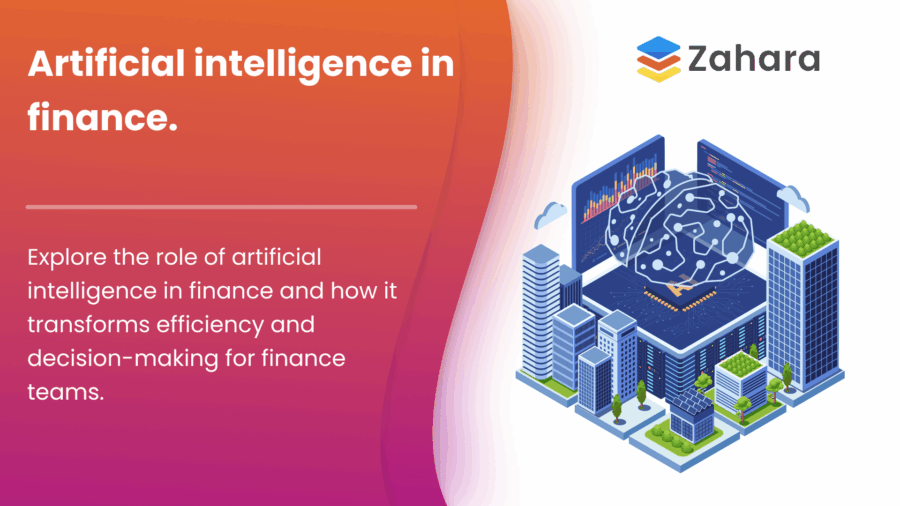From streamlining accounts payable to enhancing fraud detection and enabling real-time decision making, AI is becoming a vital asset for forward-thinking finance teams. Moving far beyond automation AI will take us into the realm of intelligent, predictive technology. In short, it’s completely changing the state of play.
Table of Contents
No longer are finance teams there just to balance books. With AI innovations they’re becoming strategic powerhouses, capable of driving efficiency, cutting costs and delivering actionable insights.
In this article, we explore the key applications of artificial intelligence in finance, the tangible benefits it brings to businesses and considerations when adopting AI technologies. We’ll also take a look at how Zahara is harnessing AI to elevate finance automation, making the lives of finance professionals not only easier but more impactful.
Key applications of AI in finance
AI is being used in finance in fascinating ways. Trading companies now use its advanced algorithms to offload stock or currency at peak, chatbots and virtual assistants are improving almost daily, in our line of work it’s reading invoices with an accuracy unthinkable even a few years ago.
Decision making
AI will learn from transactions you perform using automated software. It uses this knowledge to inform you about what’s going on in your business. It can predict upcoming transactions based on past data and make decisions for you.
AI systems will be able to spot upcoming opportunities too. Perhaps your supplier offers timely payment discounts at a certain time of the year. Now you’ll know about it with plenty of time to get prepared.
It’s predicted that in future, whole sections of business will run in the background without human intervention.
Risk management and compliance
AI enhances risk management not just through fraud prevention and detection, but also by aiding compliance. Using it you’ll have fewer human errors and greater accuracy, keeping regulators happy.
Intelligent systems can also be programmed to obey pre-defined rules. If a business decision is made that doesn’t fit those rules, it will be flagged, preventing mistakes that could cost you with regulators.
This is enhanced with greater fiscal reporting. AI-driven, automated finance enables reports that improve risk assessment quality and watch transactions in real time so you can see a financial pitfall before you’re looking up from the bottom of it.
Fraud detection and security
AI holds a microscope to every transaction your business makes with attention to detail finer than any coffee-fuelled human. It’ll spot the tricks fraudsters try to slip past you. These can be as small as a few changed numbers in the bank details – things even the best accountant’s eye can easily miss.
We have written a quick article on the latest methods for beating fraud with AP automation.
Download Our Guide to Fraud PreventionBenefits of using AI in finance
Increased efficiency and accuracy
Leveraging artificial intelligence in finance makes short work of jobs that traditionally swallow up man hours. Take automated invoice processing for example… running the process manually takes up huge swathes of a finance department’s time.
With automation this work can be done with a few clicks of a mouse. Typically, you’d be reducing processing time by up to 80%.
Add that you’ll be reducing errors in accounting to near-zero and you’re on for a winner. AI will basically streamline your entire accounting process, allowing you to tackle the bottlenecks and slip-ups that slowed the process down in the first place.
Cost reduction
All these time and error reductions save you money. No longer do you have to worry about duplicate payments – AI will pick those up before they’re paid. Payments can now be made on time all the time. That means you can take advantage of discounts.
Now financial automation has rid your finance department of the need to spend time keying invoices, they can be optimised to work on cost reductions, bottom line configurations or supplier relations. Your faster payment times will make for happier suppliers after all.
Enhanced experience
You’re not the only party to benefit from adopting AI. The great thing about artificial intelligence in finance is that it also benefits external stakeholders. Suppliers have an easier system for dealing with you, as the whole purchasing workflow will become standardised. In the wider environment, AI impacts customers too.
We’re seeing this mostly in chatbot improvements and virtual assistants that can analyse a problem and walk you to a solution. That solution should be tailored, cutting out the endless loops old chatbots can get stuck before you scream and call for human assistance.
Challenges and considerations
Data privacy and security
Naturally, migrating your business and customer data into the digital world, or new systems, comes with concerns. How safe is the information really going to be? Is it protected from hacking? What about data loss?
When making the jump to AI or automated systems you’ll want to ensure the company you’re going with has certain accreditations that prove their mettle. Zahara, for instance, holds the Cyber Essentials Plus accreditation.
Others to look out for are:
- ISO 27001
- IASME Cyber Assurance
- NCSC Assured Training
Don’t budge on end-to-end encryption. That will keep your data safe in transit and should do the same at rest. If you’re using cloud software, and you probably should be, lock in distributed storage. That keeps copies of your data at multiple locations or nodes. If one node is damaged or lost, you’ll always have a backup.
It’s important to remember that security measures like these aren’t just for internal reassurance. They’ll also give your suppliers and customers faith that you’re handling their data responsibly.
Regulatory compliance issues
This is a tough subject to pin down. AI is developing so fast that compliance is often a bit of a moving target. You can tackle this with training. Get key staff members clued up on the lay of the land. Have them keep watch on regulation. At the time of writing, here’s what both eyes should be kept on:
- EU AI Act – Europe’s comprehensive regulation categorising AI systems by risk. It is unlikely to undergo major changes but will be amended over time.
- U.S. Algorithmic Accountability Act – Aimed at requiring assessments of automated decision systems.
- UK-based companies have a harder job on their hands. Currently, the UK hasn’t passed a sweeping AI act like Europe and the US, instead opting for a pro-innovation stance. This doesn’t mean there won’t be legislation. It just means legislation is likely to be made piecemeal and applied to sector by sector, rather than the country at large.
Ethical considerations
Implementing AI systems also comes with ethical considerations. First, let’s address the big one:
Redundancy
Is AI coming for your job? The truth is that AI can replace your staff, but it doesn’t have to. AI will save your staff heaps of time, but that doesn’t make human employees dead weight.
Really, it frees them up to do more meaningful work, like improving their bottom line or adding percentages to their profits. And with the cost savings you’ll be making in other areas, you won’t have financial pressure to cut staff.
Accountability
You’ll need to have an accountable human at the helm of your AI systems. It’s the law. Humans are accountable for the parts they play in the design, implementation and use of artificial intelligence. Pick someone with a little natural intelligence… it can’t all be artificial.
Future trends in AI and finance: accounts payable
Predictive analytics
Artificial intelligence in finance moves the function from a largely reactive one into the predictive. It’ll be done by improvements in forecasting tools. The trend is that these tools will predict future payables, cash outflows and early payment discount opportunities based on historical and real-time data.
The result will be better cash flow management and the opportunity to snag a few timely deals to cut back on spending.
Zero-touch accounting
Very American, isn’t it, the use of ‘zero’ instead of ‘no’, but it does what it says on the tin. In future there will likely be finance systems that tick along in the background placing orders, processing invoices and sending payments, all without human intervention.
Machine learning makes this possible. Your systems will learn from historical approval patterns and exceptions to improve over time. Smart contracts (more on that below) will ensure everything is watertight and running as planned.
Integration with smart contracts and blockchain
The next step will likely be widespread rollout of smart contracts. These automatically release payments once AI verifies compliance with contract terms. The contracts and financial details are stored in a blockchain which makes them incredibly difficult to hack.
Additionally, because humans are removed from the equation, the process is dramatically sped up, meaning happier stakeholders all round.
Conversational AI for finance teams
AP staff will increasingly interact with AI assistants that surface real-time insights, answer compliance queries or execute tasks. This is possible with further integration between chat-based interfaces and back-end AP systems.
With that integration achieved, finance teams will spend less time navigating systems or reports. Instead, they can query results or info with an AI assistant, saving them time and further streamlining their tasks.
How Zahara utilises artificial intelligence in finance to enhance automation
At Zahara we use artificial intelligence to up the capabilities of our financial automation software. It works on a few of the principles we’ve mentioned above and delivers all the benefits.
AI-Driven invoice capture and OCR
Take our invoice processing software for example. When you feed an invoice into Zahara, Optical Character Recognition (OCR) reads the information and passes it on to AI to be made sense of.
AI decides what to do with the invoice. Does it need flagging as a fraud? Is it ready for payment? Is there anything unusual about it? All of this is decided in seconds. Decisions are then routed through your pre-defined workflow so that someone in your finance team can decide
Automated workflow routing and three-way matching
AI will also match your invoices against purchase orders (POs) and goods received notes (GRNs) checking to ensure consistency and flag discrepancies such as mismatched values or missing POs or receipts. This is known as three-way matching. It ensures a very tight ship as payments are concerned.
A word from Zahara
Zahara accounts payable automation software is designed with the user and the future in mind. If financial automation software can make the work of your finance team easier then we’ll look into every way to make that happen. Much of what we offer uses the cutting edge of tech to get that done.
If you’d like to see how that works as a function of your business, we’d love to hear from you. Give us a call, or schedule a demo and we’ll show you how we can streamline your accounts payable.
Artificial intelligence in finance FAQs
AI is used to enhance financial automation by improving compliance, efficiency and decision-making.
AI is streamlining operations, reducing human error, and enabling faster, data-driven decisions. It helps financial institutions improve accuracy in forecasting, personalise client experiences, detect fraudulent activity in real time, and automate routine processes.
Yes. While AI brings many benefits, it also introduces risks such as data bias, model overfitting and cybersecurity vulnerabilities. Proper governance and regulatory oversight are critical.


